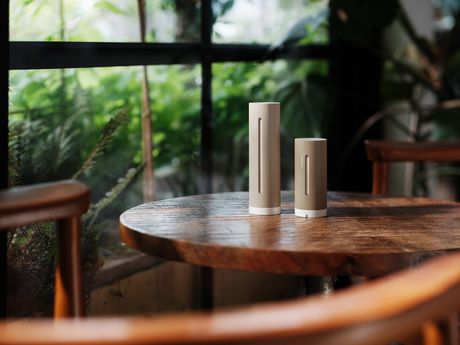
Netatmo dévoile la nouvelle Station Météo ORIGINAL

Poste de dépenses déjà majeur chez les ménages français, la consommation d’électricité devient de plus en plus importante. Alors que le prix de l’électricité augmente en permanence, apprenez à mieux comprendre et à diminuer votre consommation électrique moyenne. Nul doute que vous ressentirez ces économies sur votre facture.
Prenons plusieurs exemples pour avoir un ordre d’idée. Un studio de 30 mètres carrés dont le chauffage et l’eau chaude fonctionnent à l’électricité consomme environ 4 350 kWh par an en moyenne. S’ils utilisent une autre énergie, attendez-vous à une estimation autour de 970 kWh par an en moyenne. Dans le cas d’une grande maison de 150 mètres carrés, si elle est équipée d’un système de chauffage et d’eau chaude à l’électricité, la consommation moyenne sera de 23 500 kWh chaque année et 2 800 kWh si ce n’est pas le cas. L’écart est alors immense !
Les estimations changent selon les années et les sources, mais les chiffres restent de cet ordre de grandeur.
Un logement de 75 mètres carrés avec 3 à 4 habitants consommant de 10 000 à 14 000 kWh par an paiera une facture d’électricité comprise entre 1 500 et 2 100 €, selon le fournisseur. En effet, le prix du kWh dépend de l’offre choisie, du fournisseur et/ou des tarifs réglementés de l’électricité. De plus, ce prix augmente chaque année.
Superficie à chauffer, nombre d’habitants dans le logement, habitudes d’utilisation des appareils électriques… nombreux sont les critères qui font varier la consommation moyenne d’électricité d’un ménage. Alors comment la calculer ?
On évoque souvent la consommation électrique moyenne d’un ménage ou d’un logement, exprimée en kWh. Mais pourquoi tenter de la connaître, de la comprendre et de l’optimiser ? C’est simple, savoir calculer sa consommation quotidienne en kWh est très utile pour 2 raisons :
Vous avez donc tout intérêt à calculer ou au moins à estimer votre consommation électrique moyenne. Mais comment s’y prendre, vous demandez-vous ?
Il faut avant tout savoir que les quatre principaux postes de consommation d’électricité dans un logement sont le chauffage (en moyenne 60 % de la consommation totale pour un logement tout électrique de 60 mètres carrés !), l’eau chaude, les appareils (électriques, électroniques et électroménagers) et la cuisson. L’éclairage vient ensuite.
Pour le calcul de votre consommation électrique moyenne, prenez en considération plusieurs critères, tout en sachant que les deux premiers ont le plus d’importance :
Réduisez votre consommation électrique moyenne avec Intuis Connect with Netatmo, le module de connexion pour vos radiateurs électriques vous permettant de réaliser des économies d’énergies et d’argent sur votre facture.
Encore une question évidente, pensez-vous ? Les chiffres sont impressionnants et le prix de la facture annuelle peut évoluer du simple au double. Un ménage économe dans ses pratiques énergétiques ne se chauffant pas à l’électricité consomme environ 1 350 kWh par an, soit 317 €… contre 3 510 kWh et 648 € pour un ménage dépensier !
Il n’y a donc pas de petits efforts, chaque bonne habitude compte.
Pour économiser au maximum votre consommation électrique voici quelques bons gestes à effectuer :
Selon l’utilisation que vous faîtes de votre électricité, choisissez la meilleure option entre le tarif Base et le tarif HPHC.
Il s’agit de deux types de tarification de l'électricité. Avec le premier, le tarif Base, le prix de chaque kWh est le même en permanence. En revanche avec le tarif HPHC (pour Heures pleines / Heures creuses), le prix du kWh change selon l’heure de la journée : il est plus élevé tarif base classique pendant les heures pleines mais inférieur la nuit, qui représente l’essentiel des heures creuses.
Privilégiez cette seconde option si le chauffage et l’eau chaude de votre logement fonctionnent avec de l'électricité.
Pour aller plus loin dans l’estimation et le calcul de la consommation électrique moyenne de votre logement, renseignez-vous sur son DPE : le Diagnostic de performance énergétique qui vous aide à estimer la consommation d’énergie du logement selon toutes ses caractéristiques.

Chauffage
Interdiction de chaudière à gaz : on fait le point pour 2025

Chauffage
Nouvelle prime Coup de pouce Thermostat de l’État en 2024

Chauffage
Comment optimiser son chauffage en connectant le Thermostat et les Têtes Thermostatiques à la Station Météo ?

Chauffage
Consommation énergétique et qualité de l'air dans les collectivités et les ERP : où en est-on ?